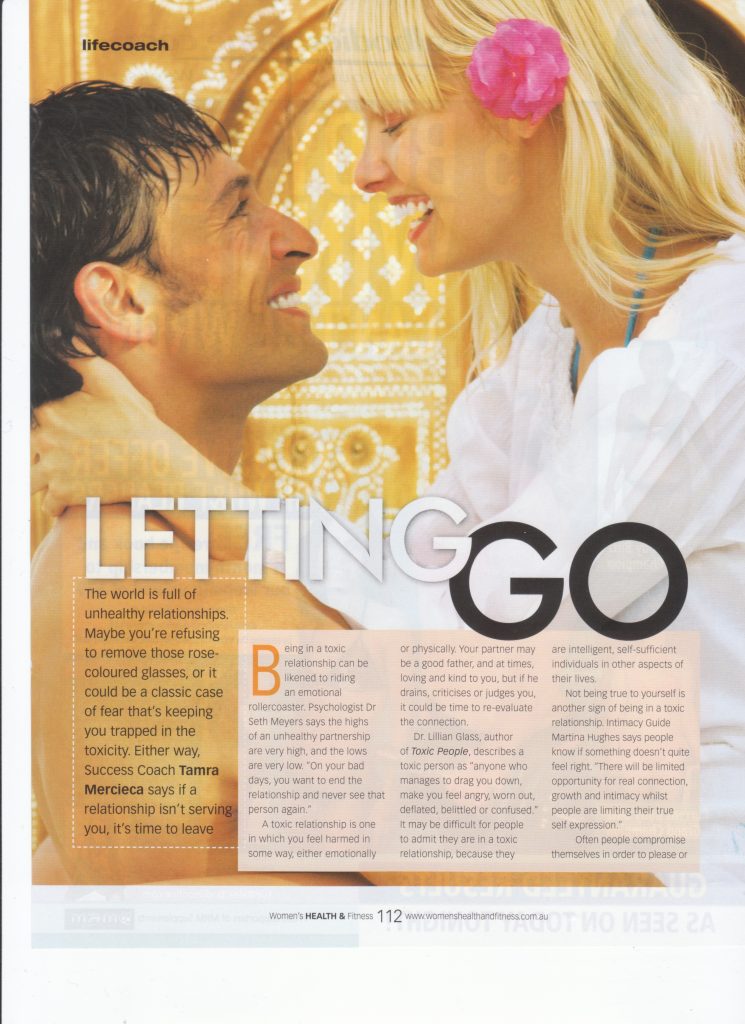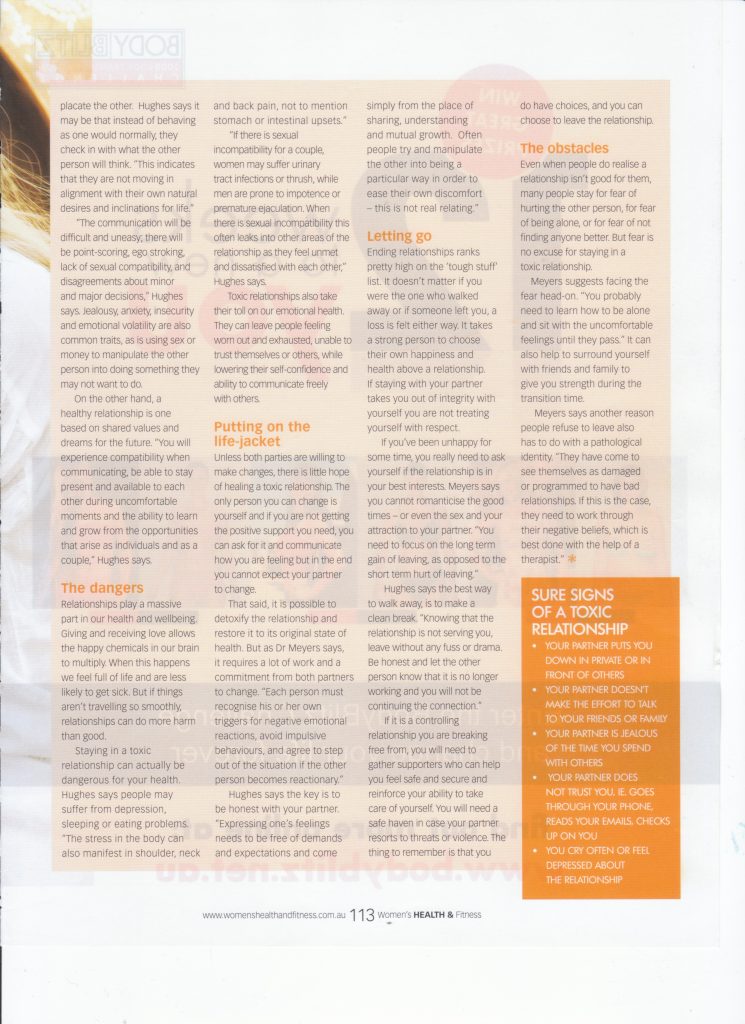

Letting Go: How to free yourself from toxic relationships
The world is full of unhealthy and toxic relationships. Maybe you’re refusing to remove those rose-coloured glasses, or it could be a classic case of fear that’s keeping you trapped in the toxicity. Either way, if a relationship isn’t serving you, it’s time to leave. And the sooner, the better.
Being in a toxic relationship can be likened to riding an emotional rollercoaster. Psychologist Dr Seth Meyers says the highs of an unhealthy partnership are very high, and the lows are very low. “On your bad days, you want to end the relationship and never see that person again.”
A toxic relationship is one in which you feel harmed in some way, either emotionally or physically. Your partner may be a good father, and at times, loving and kind to you, but if he drains, criticises or judges you, it could be time to re-evaluate the connection.
Dr. Lillian Glass, author of Toxic People, describes a toxic person as “anyone who manages to drag you down, make you feel angry, worn out, deflated, belittled or confused.” It may be difficult for people to admit they are in a toxic relationship, because they are intelligent, self-sufficient individuals in other aspects of their lives.
Not being true to yourself is another sign of being in a toxic relationship. Intimacy Guide Martina Hughes says people know if something doesn’t quite feel right. “There will be limited opportunity for real connection, growth and intimacy whilst people are limiting their true self expression.”
Often people compromise themselves in order to please or placate the other. Hughes says it may be that instead of behaving as one would normally, they check in with what the other person will think. “This indicates that they are not moving in alignment with their own natural desires and inclinations for life.”
“The communication will be difficult and uneasy; there will be point scoring, ego stroking, lack of sexual compatibility, and disagreements about minor and major decisions,” Hughes says. Jealousy, anxiety, insecurity and emotional volatility are also common traits, as is using sex or money to manipulate the other person into doing something they may not want to do.
On the other hand, a healthy relationship is one based on shared values and dreams for the future. “You will experience compatibility when communicating, be able to stay present and available to each other during uncomfortable moments and the ability to learn and grow from the opportunities that arise as individuals and as a couple,” Hughes says.
You know you’re in a healthy relationship when one person is having a bad day, and the other person is able to comfort them in a way that does not compromise their own emotional happiness. There is nothing worse than one partner bringing home their work dramas and pulling the other person down in the process. It’s ok to have a little rant to release your anxieties once in the safety of your own home, but insisting the other person feel your pain, helps no one.
The dangers
Relationships play a massive part in our health and wellbeing. Giving and receiving love allows the happy chemicals in our brain to multiple. When this happens we feel full of life and are less likely to get sick. But if things aren’t travelling so smoothly, relationships can do more harm than good.
Staying in toxic relationships can actually be dangerous for your health. Hughes says people may suffer from depression, sleeping or eating problems. “The stress in the body can also manifest in shoulder, neck and back pain, not to mention stomach or intestinal upsets.”
“If there is sexual incompatibility for a couple, women may suffer urinary tract infections or thrush, while men are prone to impotence or premature ejaculation. When there is sexual incompatibility this often leaks into other areas of the relationship as they feel unmet and dissatisfied with each other,” Hughes says.
Toxic relationships also take their toll on our emotional health. They can leave people feeling worn out and exhausted, unable to trust themselves or others, while lowering their self-confidence and ability to communicate freely with others. Once your own self-worth is on the decline, you are more prone to take on people’s judgments and criticisms, further weakening your own sense of self.
Putting on the life-jacket
Unless both parties are willing to make changes, there is little hope of healing a toxic relationship. The only person you can change is yourself and if you are not getting the positive support you need, you can ask for it and communicate how you are feeling but in the end you cannot expect your partner to change.
That said it is possible to detoxify the relationship and restore it to its original state of health and even eclipse it. But as Dr Meyer says, it requires a lot of work and a commitment from both partners to change. “Each person must recognise his or her own triggers for negative emotional reactions, avoid impulsive behaviours, and agree to step out of the situation if the other person becomes reactionary.”
Hughes says the key is to be honest with your partner. “Expressing one’s feelings needs to be free of demands and expectations and come simply from the place of sharing, understanding and mutual growth. Often people try and manipulate the other into being a particular way in order to ease their own discomfort – this is not real relating.”
What you will find however, is that if you take responsibility for your own emotions and behaviours, you will feel more empowered. A person may say or do something inappropriate or unloving, but it is up to you to decide how you react, and how it effects your emotional state. You can only feel hurt from another’s nasty comments if there is a part of you (even just a tiny part) that believes those comments to be true.
Identifying what triggers off this kind of reaction gives you something to work with. It highlights your own insecurities so you can work through them. Once you are able to release the negativity you hold about yourself, you will no longer take on other’s criticisms. Their harsh words will simply bounce off you. Becoming bullet proof to other people’s razor sharp taunts is priceless for your own wellbeing.
Letting go
Ending toxic relationships ranks pretty high on the ‘tough stuff’ list. It doesn’t matter if you were the one who walked away or if someone left you, a loss is felt either way. It takes a strong person to choose his or her own happiness and health above a relationship. If staying with your partner takes you out of integrity with yourself you are not treating yourself with respect.
If you’ve been unhappy for some time, you really need to ask yourself if the relationship is in your best interests. Meyers says you cannot romanticize the good times – or even the sex and your attraction to your partner. “You need to focus on the long term gain of leaving, as opposed to the short term hurt of leaving.”
Hughes says the best way to walk away, is to make a clean break. “Knowing that the relationship is not serving you, leave without any fuss or drama. Be honest and let the other person know that it is no longer working and you will not be continuing the connection.”
If it’s a controlling relationship you are breaking free from, you will need to gather supporters who can help you feel safe and secure and reinforce your ability to take care of yourself. You will need a safe haven in case your partner resorts to threats or violence. The thing to remember is that you do have choices, and you can choose to leave the relationship.
The obstacles
Even when people do realise a relationship isn’t good for them, many people stay, for fear of hurting the other person, for fear of being alone, or for fear of not finding anyone better. But fear is no excuse for staying in a toxic relationship.
Meyers suggests facing the fear head-on. “You probably need to learn how to be alone and sit with the uncomfortable feelings until they pass.” It can also help to surround yourself with friends and family to give you strength during the transition time.
When I’m coaching my clients on relationships, I suggest they date themselves. Pour all the energy they would into the other person, into themselves. That might mean buying yourself a bunch of flowers, giving yourself compliments or planning a date night for you. Booking in for a massage or relaxing into a warm bath with candles are other ways that help nurture your soul.
Meyers says another reason people refuse to leave toxic relationships also has to do with a pathological identity. “They have come to see themselves as damaged or programmed to have bad relationships. If this is the case, they need to work through their negative beliefs, which is best done with the help of a therapist.”
Therapists who work with techniques that deal with the subconscious mind will help release this unwanted negativity from your life. Once it’s been thrown out with the trash, you will know you are worthy of attracting in a healthy relationship that is full of love, happiness and support.
Sure signs of a TOXIC relationship:
- Your partner puts you down in private or in front of others
- Your partner doesn’t make the effort to talk to your friends or family
- Your partner is jealous of the time you spend with others
- Your partner does not trust you, ie. goes through your phone, reads your emails, checks up on you
- You cry often or feel depressed about the relationship
- You are dependant on your partner for your happiness
- Your friends don’t like your partner
- Your partner overrules you when making decisions
- Your self-esteem is lower since entering the relationship
- A relationship that is abusive either verbally or physically
Want to learn more about dating yourself? Click here to read more and listen to an inspirational audio on the topic.
